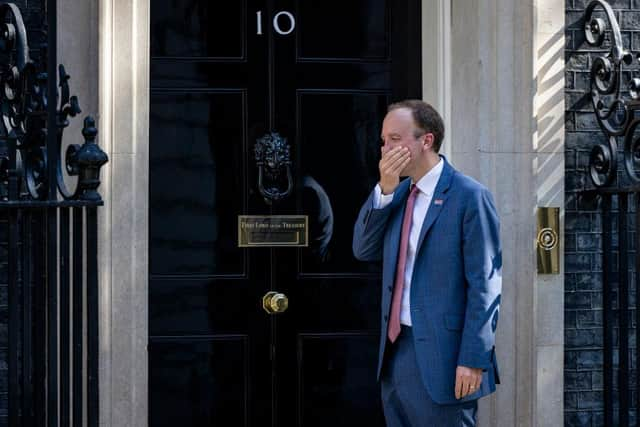Delta Covid Variant: Matt Hancock claims ‘I took action to tackle variant before it was even under investigation’
and live on Freeview channel 276
The Health Secretary has told MPs he acted to protect people in Britain from the Delta variant, formerly known as the Indian variant, before it had even been determined by scientists as ‘under investigation’.
Matt Hancock made the statement as he addressed the House of Commons, following the Prime Minister’s announcement that Covid restrictions will remain in place until 19 July.
Advertisement
Hide AdAdvertisement
Hide AdWe want to hear from you: let us know what you think about this story and be part of the debate in our comments section below


‘I took action to tackle this variant before it was designated even as a variant under investigation’
His comments come over a month after Shadow Health Secretary Jonathan Ashworth blamed Boris Johnson’s government for a “catastrophic misstep,” leaving UK borders "about as secure as a sieve," and accused Matt Hancock of ignoring advice to prevent travel from India to the UK.
Hancock, responding to criticism of the time taken to act against the Delta variant first identified in India, told the Commons: “I took action to tackle this variant before it was designated even as a variant under investigation as I took action to tackle this variant before it was designated even as a variant under investigation.”
He added: “On the Delta variant, we acted before it was recommended as a variant of concern by the scientific process.
Advertisement
Hide AdAdvertisement
Hide Ad“In fact, I have kicked off a review of that process because I think it is the process and the scientific advice that should advise me of the variants of the concern.
“But having looked and seen the data in India, we took action even before it was recommended.”
Delta is the new name given to the Indian variant by the World Health Organization (WHO), which also renamed the Kent variant ‘Alpha’.
Covid variants were renamed as letters of the Greek alphabet to avoid “stigma”, the World Health Organisation has announced on 4 June.
Advertisement
Hide AdAdvertisement
Hide AdInstead of being named after the place they were discovered, experts working with the WHO have developed the new labels for variants of the virus.
Doctors have now urged the public to get both shots of the coronavirus vaccine, as research conducted in Scotland showed the Delta variant nearly doubles the risk of hospitalisation.
‘learn to live with the virus’
Those affected with the Delta variant are reportedly 85 percent more likely to be hospitalised than those with the Alpha variant, first found in Kent.
On 21 June, Boris Johnson told a Downing Street press conference that the UK was under significant threat from the various variants, and as such any further easing of lockdown would not be made until 19 July.
Advertisement
Hide AdAdvertisement
Hide AdAt the press briefing, he was accompanied by Chief Medical Officer Professor Chris Whitty, who said it was inevitable that coronavirus would continue to mutate (create new variants) and that the UK would need to learn to live with the virus.
Following Johnson’s briefing, Hancock said it “isn’t inevitable” there will be a rise of Covid-19 infections in autumn and winter, as booster shots will help reduce infection rate. due to the vaccine programme.
Conservative former chief whip Mark Harper, chairman of the Covid Recovery Group, asked the Health Secretary to confirm that July 19 is a “terminus date”, adding: “Can he rule out bringing back restrictions in the autumn and winter when we see a rise, an inevitable rise, in what is a respiratory virus?”
Hancock replied: “Well, it isn’t inevitable, I don’t think it’s inevitable. It may happen but it’s not inevitable because we also have the planned booster programme to strengthen further the vaccination response.
Advertisement
Hide AdAdvertisement
Hide Ad“But it is absolutely clear, based on all the clinical advice that I’ve seen, that a goal of eradication of this virus is impossible.”
Hancock reiterated Professor Whitty’s comments, adding: “We must learn to live with this virus and we must learn how we can live our normal lives with this virus so I reflect the Prime Minister’s words, which I of course concur with entirely on July 19.”
Comment Guidelines
National World encourages reader discussion on our stories. User feedback, insights and back-and-forth exchanges add a rich layer of context to reporting. Please review our Community Guidelines before commenting.